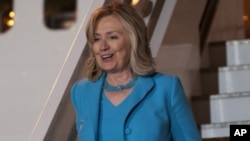U.S. Secretary of State Hillary Clinton has begun a visit to Greece after telling officials in Turkey she wants to see an early solution to the Cyprus dispute. Clinton’s talks with Greek officials will also cover that country’s economic crisis.
U.N.-sponsored peace talks between the Greek and Turkish authorities on Cyprus have been underway since 2008 with little visible success.
But Clinton, as she ended a two-day visit to Istanbul said she supported Turkish calls for a resolution of the long-running conflict by 2012, when Cyprus is due to take over the European Union presidency for the first time.
"We don’t think the status quo on Cyprus benefits anyone. It’s gone on for far too long. We believe both sides would benefit from a settlement. And we strongly support the renewed, re-energized effort that the United Nations is leading, and that the Cypriots themselves are responsible for, because ultimately they’re the ones who are going to have to make the hard decisions about how to resolve all of the outstanding issues," she said.
Turkey has threatened to freeze relations with the E.U. if Cypus assumed the presidency without a settlement of the dispute.
Clinton said the United States wants to see a bi-zonal, bi-communal federation on the island and “would like to see it as soon as possible.”
Cyprus has been divided along ethnic lines since 1974 when Turkish troops occupied the northern third of the island in response to a coup in Nicosia aimed at union with Greece.
The last major push for a settlement foundered in 2004 when a U.N. backed referendum on a bi-zonal federation was voted down by Greek Cypriots.
A senior official traveling with Clinton said the Greek economic crisis would dominate her meetings in Athens and that Clinton would press both in public and private for support for Prime Minister George Papandreou’s austerity program, aimed at securing additional European and international rescue loans.
Before leaving Istanbul Saturday, Clinton told young Turks at a televised coffee shop dialogue that she was troubled by Turkey’s arrest of dozens of journalists and said it was “inconsistent” with the economic and political progress the country has been making.
Media watchdog groups say about 60 reporters are jailed, many working for leftist or Kurdish publications. The Secretary also noted the issue at a closing press event with Turkish Foreign Minister Ahmet Davutoglu.
“Turkey’s upcoming constitutional reform process present an opportunity to address concerns about recent restrictions that I heard about today from young Turks, about the freedom of expression and religion, to bolster protections for minority rights, and to advance the prospects for (Turkish) E.U. membership, which we who wholly and enthusiastically support," she said.
Clinton paid a high-profile call on Istanbul-based Orthodox Christian Ecumenical Patriarch Bartholomew, who has complained of church seizures and other harassment by Turkish authorities.
In her public remarks with Foreign Minister Davutoglu, Clinton urged the reopening of the Halki Seminary, an Eastern Orthodox theological school that was shut down by Turkish authorities in 1971.
Clinton Pushes Cyprus Solution in Turkey, Greece




